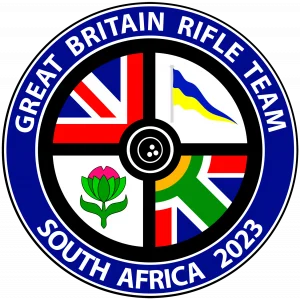2023 GB Rifle Team member Rosanne Furniss looks at the role of women in target rifle shooting and how recent progress can be embedded into its future to benefit us all

Fullbore target rifle shooting is one of the few sports where men and women can compete on an equal basis. We see multiple examples of women competing at the highest level in open competitions, including Commonwealth Games and World Championships.
Yet, in the UK, the latest Home Office statistics show that men account for 97% of the 151,000 firearms certificate (FAC) holders, with only 5,180 women holding an FAC. Perhaps unsurprisingly, less than 5% of all Great Britain caps in the Target Rifle (TR), Match Rifle (MR) and F-Class disciplines have been awarded to women.
Women in international target shooting
Historical records suggest opportunities for women to progress to the highest competitive levels have grown significantly in recent decades. Of the 45 women ever to have represented Great Britain in rifle shooting, 36 were awarded their first caps between 1990 and 2022. But the proportion of female entrants in large, open competitions in the UK significantly exceeds those who make it to the highest competitive level of team shooting.
Trailblazers such as Marjorie Foster (first capped for GB in 1949), Jean Orpen-Smellie (1966) and Carol Painting (1968) opened the door for female competitors at the highest international level. Jane Messer was the first woman to be awarded the prestigious ‘Big 5’ badge in 1995. Jane was also the first woman to represent GB in the Palma Match in 1992, followed by Sarah Kent (1995), Marijcke Veltman-Grisenthwaite (1999), Alice Ogilvie and Alex Pilgrim (both in 2003).
In 1997 there were 5 female members of the GB Cadet team (the Athelings). 3 of those, Emma Cannings, Erica McMullan and Jacqui McQuillan (nee Rankin) then undertook international leadership roles as GB Under 25 Captain or, in Emma’s case, as Commandant to the 2008 GB Under 19 Team to South Africa.
In 2000, Dorothy Dallas (nee Hume) captained the GB Under 25 team to South Africa with Mary Boston as her Adjutant. Later that year Jo Hossack won HM the Queen’s Prize at Bisley, becoming the second female and youngest ever winner.
In 2010, LouLou Brister became the first female captain of the GB Match Rifle Team and continues to lead the Welsh Match Rifle Team. In 2015, Jane Messer captained the GB Palma Team for the World Championships at Camp Perry, USA. The team delivered a world record score.
In the 2022 season we saw perhaps the most significant in a series of breakthrough years for women in the Target Rifle discipline. Chloe Evans and Rosanne Furniss shot for Great Britain in the Kolapore Match. Alice Good won HM the Queen’s Prize, becoming only the third female winner (GM). Female competitors took 7 of the top 50 places in the Grand Aggregate, won the first stage of HM the Queen’s Prize and finished 2nd and 3rd in the St George’s. In October, Lucinda Taylor was crowned European Long-Range Individual Champion.
This pipeline of highly talented women appears stronger than ever, with five female members of the 2023 GB squad to South Africa. In 2024, GB’s captain for the Under 25 World Championships in South Africa will be Harriet Bramwell and over a third of the Under 21 and Under 25 squads are female.
We could, and should, be doing more to celebrate these successes.
So, things are heading in the right direction but what can we do to improve it further?
There are multiple examples of national sporting governing bodies creating impactful strategic initiatives to improve participation rates across all competitive levels. For example, the British Triathlon outreach programme and the South African Rugby Union quota system, to name but two. Whether or not our governing body will prioritise the allocation of resources to build and deliver such initiatives, including support for the elite competitive end, remains to be seen. If we want to accelerate our progress let’s assume we will need to self-organise. There are a few key themes that we could explore:
Community and Networks
If you speak to the women who have taken up the sport and continued in it, they have often had support from those around them, whether family or friends.
When I started competitive shooting in 2006 I took up Match Rifle and Target Rifle. I managed to get in the top 200 of the Grand Aggregate twice in three years but I was not on anyone’s radar as someone who might want to continue Target Rifle shooting. This was different to Match Rifle – with a smaller field of entrants, I was welcomed, and was able to learn the names of several shooters, building friendships outside of the student group I was part of. Support from successful women in the sport like Silke Lohmann provided a network that encouraged friendships and celebrations of success, that has continued with the International Match Rifle Ladies – an amazing opportunity to introduce more women to team shooting each year. It’s no coincidence that for 10 years, Match Rifle was the only fullbore shooting I did.
Opportunity
When I shot my first Elcho match in 2009 (as the first woman to shoot for England in the Elcho), the Match Rifle community was welcoming and supportive. It hadn’t mattered how new I was to shooting. England’s captain, Nick Tremlett, was very conscious of providing fair opportunities for any shooters who were performing well.
How many women or other underrepresented groups miss out on opportunities because much of our sport still relies on who you know? If you weren’t lucky enough to go to a ‘shooting school’ or be part of a cadet team that offered shooting, how do you get to know where to get a rifle, which clubs are the best value, how to get to know the various clubhouses at Bisley or who the captains of the teams are? This is a huge opportunity for all of us to build upon.
In particular, transparent application and selection processes can only benefit the majority of team applicants and provide support to Team Captains. Meritocracy at the highest level will aid the longevity of our sport.
This isn’t all just for the benefit of the women who may make the top teams; there is lots of evidence of the benefits to outcomes of more diverse teams. Sports psychologists identify improved outcomes in mixed teams due to a wider range of responses to stressors. The ‘Tend-and-Befriend’ alternative to the Fight-or-Flight response skews heavily towards females and can support greater resilience to stressful situations. Anyone who has shot in a match for their country will know it can be stressful.
Understanding and embracing differences
With fewer women around the shooting world, some of the strengths that can be stereotypically associated with women can be undervalued. Equally, the benefits of some male-orientated traits can be overemphasised. For instance, creating an environment where a few tears are normal should be normal! Diverse teams will improve overall outcomes in those circumstances.
Societally, differences between men and women (Invisible Women is a great read for anyone who likes data) are better understood than ever before. For instance, the effects of the menstrual cycle on sporting performance is now better understood. Studies have shown that hormonal fluctuations during the menstrual cycle can impact training and performance capacity. As research progresses it will be important to consider how this effects more diverse teams.
“It is not something that is considered much but is now being discussed more openly in other sports which I think is fantastic and should be talked about more in shooting.”
Chloe Evans
Fewer barriers to participation
It’s the little things that go unnoticed by those not directly impacted. Like not having to pay a premium for accommodation just because you’re the only woman in a group. It’s also great to see more suppliers offering shooting kit designed to fit female body shapes – and of course the increase in pink as a colour option has been beneficial to some!
But in my opinion the most important thing we can all do is provide support that has no ulterior motive behind it – easing routes into the sport whether that’s through providing help on the firing point if someone is struggling or ensuring loans of kit that fits women to ensure they can continue to compete on an equal basis, or pointing new shooters towards the network of established female shooters and male allies.
Organisations like the British Young Shooters Association (BYSA) now provide accommodation, lockers and events to encourage more young shooters into target rifle shooting, and that’s a perfect opportunity to support more women into the sport.
“If you’re ‘young’, then contacting BYSA too will be the best decision you ever make. They provide a supportive and straightforward way into the world of fullbore shooting and can provide all of the equipment you need to get started.”
Alice Good GM
In the world of business, there is extensive research showing the importance of female role models and the impact of exposure to people of the same gender to address historical imbalances. In STEM (science, technology, engineering and maths) in particular, huge focus has been put on to addressing the disparity between men and women (for example, 51 of the 904 individuals awarded the Nobel Prize between 1901 and 2018 were women. The disparity we see in our shooting discipline is similar. Creating the environment where female success in target shooting is normalised will inspire others and we should women’s achievements wherever possible.
When I returned to TR ten years after university, things were already feeling different. I have been privileged to have shot for a female captain for my first National Match, to have shot my first Kolapore Match alongside Chloe Evans and to be on my first GB overseas tour with five women in the squad. I am honoured to be representing female British shooters overseas knowing that Alice Good is the reigning Sovereign’s Prize Winner.
These role models can be found around the world; internationally there are many female competitive shooters who have established themselves as top competitors in their respective countries. I asked some of them about their sporting journeys, click on the photos to learn more:









